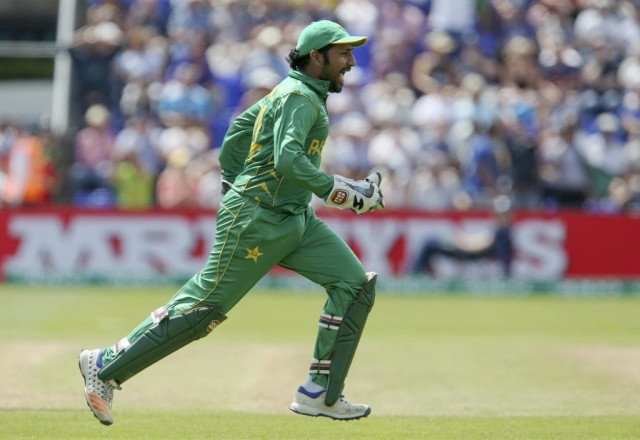How streetwise Sarfraz revived Pakistan cricket
In his short tenure, Sarfraz has turned a group of out-of-form prima donnas into unlikely winners

THINKING CAPTAIN: Pakistan's streetwise cricket captain has turned a group of out-of-form prima donnas into unlikely winners. PHOTO: AFP
But just like that, the same bunch of derided players turned it around and etched their names into cricketing folklore, thanks in large parts to their maiden ICC Champions Trophy triumph, which came at the expense of arch-rivals India of all the countries.
Sarfraz gets hero's welcome as team returns home
“Adversity causes some men to break; others to break record” some wise man once said. The Men in Green had suffered plenty of breaking in recent years. This time, under Sarfraz Ahmed's leadership, they chose to break records. Instead of wilting under pressure like they so often have, the Karachiite's men became uncharacteristically immune to pressure.
Handed the reins of the limited-overs side due to predecessor Azhar Ali's resignation following their thrashing Down Under, Sarfraz has awoken the sleeping giant as Pakistan won six out of eight matches under him — a winning percentage of a staggering 75. Under the previous regime, the same group had won just five times in 13 attempts, which adds up to a meagre 38% winning ratio.
Team takes plaudits as underdogs return as champions
So what has caused such a drastic transformation in such a short time? By the look of it, it’s Sarfraz’s clear thinking that has helped his team shed its defensive mindset, which was first introduced by Misbahul Haq and carried forward by his life-long devotee Azhar.
One hallmark of every good captain is his ability to make a weak team look stronger than it actually is. The prime example of this trait was former New Zealand captain Stephen Fleming, who kept an extremely limited generation of players competitive with the rest of the world.
Sarfraz, in a very short span of time, has also shown signs of the same. He has put his faith in young and new talent such as Shadab Khan, Faheem Ashraf, Fakhar Zaman and Rumman Raees, giving them the liberty to take risks instead of going into their shell — something you never associated with our skippers of the recent past.
This Indian's heart-warming message to Pakistan cricket team is going viral
The streetwise captain out of Buffer Zone also has an intelligent cricketing brain reminiscent of the great Wasim Akram but the kind that had since gone extinct, or almost extinct.
It's clear that Sarfraz is a proponent of proactive cricket rather than reactive cricket. He is more aggressive than passive, something evident as early as in the game against South Africa when he kept a slip for Hasan Ali against JP Duminy and masterminding the leftie's downfall.
In the next game, against Sri Lanka, he reintroduced both Mohammad Amir and Junaid Khan in the middle overs, another masterstroke that paid instant dividend and triggered a collapse for the Islanders.
ICC snubs Amir for Champions Trophy team of the tournament
In the semi-final and final, he persisted with a short-leg fielder against Eoin Morgan and MS Dhoni — the intent of an aggressive leader who wants to win rather than not lose.
And despite a mammoth total to defend in the ultimate game, he deployed two men in the slip cordon, a field placement that would've sent Virat Kohli back to the pavilion moments before he actually went, had it not been for Azhar being Azhar.
But while Sarfraz does tend to trust his youngsters, it doesn't happen at the cost of marginalising the seniors. The 35-year-old Shoaib Malik remains a trusted confidant and was the first to get a hug from Sarfraz, both after the recent final and the series win against the West Indies.
That is not to say that the man can do no wrong. His decision can and have backfired too. His batting order still has room for improvement, while he sometimes can be too selfless with the bat. Having said that, it's nothing he can't iron out.
In his short tenure, Sarfraz has turned a group of out-of-form prima donnas into unlikely winners, much like the great Imran Khan did in 1992. For that, this man deserves all that's coming his way. Thank you, Sarfraz!



















COMMENTS
Comments are moderated and generally will be posted if they are on-topic and not abusive.
For more information, please see our Comments FAQ